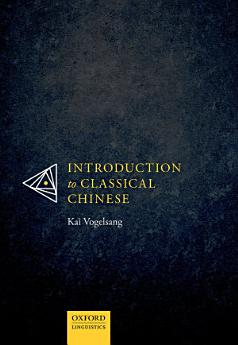Introduction to Classical Chinese
ສ.ຫ. 2021 · Oxford University Press
5,0star
1 ຄຳຕິຊົມreport
ປຶ້ມອີບຸກ
560
ໜ້າ
family_home
ມີສິດ
info
reportບໍ່ໄດ້ຢັ້ງຢືນການຈັດອັນດັບ ແລະ ຄຳຕິຊົມ ສຶກສາເພີ່ມເຕີມ
ກ່ຽວກັບປຶ້ມ e-book ນີ້
This textbook provides a comprehensive scholarly introduction to Classical Chinese and its texts. Classical Chinese is the language of Confucius and Mencius and their contemporaries, who wrote the seminal texts of Chinese philosophy more than 2,000 years ago. Although it was used as a living language for only a relatively short time, it was the foundation of Chinese education throughout the Imperial age, and formed the basis of a literary tradition that continues to the present day. This book offers students all the necessary tools to read, understand, and analyse Classical Chinese texts, including: step-by-step clearly illustrated descriptions of syntactic features; core vocabulary lists; introductions to relevant historical and cultural topics; selected readings from classical literature with original commentaries and in-depth explanations; introductions to dictionaries and other reference works on the study of ancient China; and a guide to philological methods used in the critical analysis of Classical Chinese texts. The extensive glossary provides phonological reconstructions, word classes, English translations, and citations to illustrate usage, while the up-to-date bibliography serves as a valuable starting point for further research.
ການຈັດອັນດັບ ແລະ ຄຳຕິຊົມ
5,0
1 ຄຳຕິຊົມ
ກ່ຽວກັບຜູ້ຂຽນ
Kai Vogelsang is Professor of Sinology at the Asien-Afrika-Institut, University of Hamburg. He has published widely on Chinese language, culture, and history. His most recent works include Geschichte Chinas [History of China] (5th edition; Reclam, 2018) and Shangjun shu: Schriften des Fürsten von Shang (Kröner Verlag, 2017).
ໃຫ້ຄະແນນ e-book ນີ້
ບອກພວກເຮົາວ່າທ່ານຄິດແນວໃດ.
ອ່ານຂໍ້ມູນຂ່າວສານ
ສະມາດໂຟນ ແລະ ແທັບເລັດ
ຕິດຕັ້ງ ແອັບ Google Play Books ສຳລັບ Android ແລະ iPad/iPhone. ມັນຊິ້ງຂໍ້ມູນໂດຍອັດຕະໂນມັດກັບບັນຊີຂອງທ່ານ ແລະ ອະນຸຍາດໃຫ້ທ່ານອ່ານທາງອອນລາຍ ຫຼື ແບບອອບລາຍໄດ້ ບໍ່ວ່າທ່ານຈະຢູ່ໃສ.
ແລັບທັອບ ແລະ ຄອມພິວເຕີ
ທ່ານສາມາດຟັງປຶ້ມສຽງທີ່ຊື້ໃນ Google Play ໂດຍໃຊ້ໂປຣແກຣມທ່ອງເວັບຂອງຄອມພິວເຕີຂອງທ່ານໄດ້.
eReaders ແລະອຸປະກອນອື່ນໆ
ເພື່ອອ່ານໃນອຸປະກອນ e-ink ເຊັ່ນ: Kobo eReader, ທ່ານຈຳເປັນຕ້ອງດາວໂຫຼດໄຟລ໌ ແລະ ໂອນຍ້າຍມັນໄປໃສ່ອຸປະກອນຂອງທ່ານກ່ອນ. ປະຕິບັດຕາມຄຳແນະນຳລະອຽດຂອງ ສູນຊ່ວຍເຫຼືອ ເພື່ອໂອນຍ້າຍໄຟລ໌ໄໃສ່ eReader ທີ່ຮອງຮັບ.




